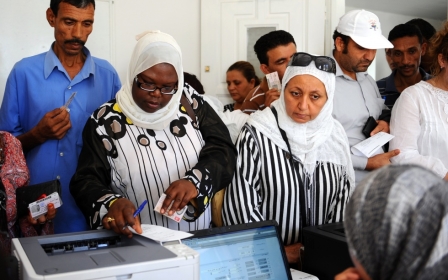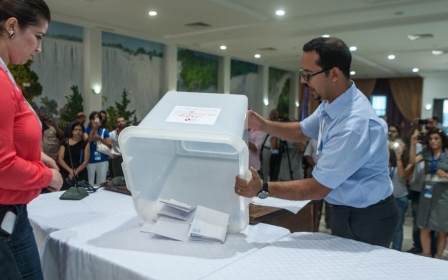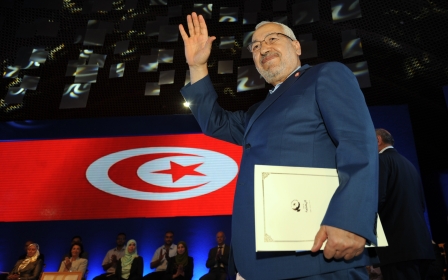Tunisia's Ennahda concedes poll defeat, congratulates Nidaa

The leader of Tunisia's main Islamist party on Monday called his rival in the secular Nidaa Tounes party to congratulate him for winning a weekend parliamentary election, his daughter said.
"#Ennahda president Rachid Ghannouchi congratulates B Sebsi (Beji Caid Essebsi) on his party's win... a few moments ago," Soumaya Ghannouchi said on Twitter after her father's Ennahda party admitted it had finished behind Nidaa Tounes in Sunday's election.
The organisers of the election have yet to announce its results, but both Nidaa Tounes and Ennahda have said their estimates show that they finished first and second, respectively.
The distribution of parliamentary seats is also yet to be announced, but under Tunisia's electoral system, the party that wins the most is given a mandate to form a coalition government.
Sunday's election and a presidential vote set for November 23 are seen as crucial to building sustainable institutions in Tunisia nearly four years after the revolution.
The general election is also seen as critical for democracy in the cradle of the Arab Spring.
The first parliamentary election since Tunisia's 2011 revolution pitted Ennahda against secular opponent Nidaa Tounes, with an array of leftist and Islamist groups also taking part.
Analysts predicted no single group would win the outright majority needed to govern alone.
Second place
But Ennahda -- which held power for two years after the revolution -- said it had been beaten into second place according to preliminary vote counts.
"They (Nidaa Tounes) are ahead by around a dozen seats," Ennahda spokesman Zied Laadhari told AFP.
As of Monday night, Nidaa Tounes had won 83 seats, or 38 percent, of the parliament. Ennahda, on the other hand, earned second place with 68 seats, or roughly 31 percent of the total vote.
Nidaa Tounes, whose name means "Call of Tunisia", had boasted on Facebook that it had bested its rival.
"We won. Long live Tunisia," it said.
Speaking earlier, party leader Beji Caid Essebsi was slightly more cautious.
"We have positive indications that Nidaa Tounes could be leading," the 87-year-old told reporters.
Several media outlets, including Al-Mutawassit television, projected a lead of around 20 seats for Nidaa Tounes.
Ennahda's leader Rachid Ghannouchi put the emphasis on consensus.
"Whoever comes out top, Nidaa or Ennahda, the main thing is that Tunisia needs a government of national unity, a political consensus," he told Hannibal television.
"This is the policy that has saved the country from what other Arab Spring countries are going through."
The election's organisers have until October 30 to announce the final outcome.
The provisional turnout was 61.8 percent.
'Important milestone'
Some 80,000 security forces were deployed on polling day, which passed without major incident, as some three million from an electorate of five million people voted for a 217-seat parliament under a new constitution drafted in January.
US President Barack Obama hailed the vote as "an important milestone in Tunisia's historic political transition".
Giving a stamp of approval, the head of the European Union's election observer mission, Annemie Neyts-Uytterbroeck, said voting had been "more than satisfactory".
Tunisia is seen as a beacon of hope compared with other chaos-hit countries like Libya and Egypt, where regimes were also toppled during the Arab Spring of three years ago.
But its transition has been tested by militant attacks and social unrest, while poverty and unemployment, which were key factors that sparked the 2011 revolt, remain unresolved.
The whole campaign was fought on the axis of the economy and security.
Ennahda has proposed the formation of a government of national unity and has not put forward a candidate for a November 23 presidential election, keeping its options open over whom it will back.
New MEE newsletter: Jerusalem Dispatch
Sign up to get the latest insights and analysis on Israel-Palestine, alongside Turkey Unpacked and other MEE newsletters
Middle East Eye delivers independent and unrivalled coverage and analysis of the Middle East, North Africa and beyond. To learn more about republishing this content and the associated fees, please fill out this form. More about MEE can be found here.




